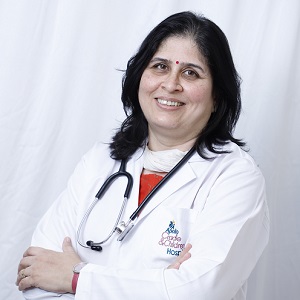What are cervical issues?
Vertebrae, joints, tendons, and ligaments of the neck are all affected by cervical issues. Injuries or degeneration of the spinal structures brought on by wear and tear, stress, smoking, or age are to blame.
If you're experiencing neck discomfort, it's likely because of a problem with your cervical spine. You may also have numbness and weakness all over your body, including your head, jaw, shoulders, hands, and legs. Coordination and balance issues, as well as respiratory distress and incontinence, are further concerns.
Types of Cervical Issues
- A condition characterised by pain in the neck and shoulders is called cervical radiculopathy. When vertebrae in the neck press on a nerve in the neck, this disease develops.
- Discomfort in the neck. Many accidents and illnesses cause or are accompanied by neck discomfort. Degenerative diseases, whiplash, mental stress, physical strain, bad posture, growths, meningitis, rheumatoid arthritis, cancer, and more are all potential triggers.
- A degenerative disc condition of the cervical spine. As a result of normal wear and tear, the discs in your cervical spine might deteriorate, leading to cervical degenerative disc disease.
- Cervical spondylosis, commonly known as "neck arthritis," is the gradual wear and tear on the cervical spine's discs and joints that comes with advancing age.
- Traumatic break of the cervical spine. Compression fractures are the most common spinal fracture, although other possibilities include burst fractures.
Symptoms of Cervical Issues
- Discomfort in the cervical region might spread to the upper back and shoulders.
- Headaches
- There is a grinding sensation whenever you turn your neck.
- The inability to put weight on your arms and legs
- Feelings of numbness in the upper limbs
- Lack of flexibility in the neck
- Problems with maintaining equilibrium
- Having problems maintaining bowel or bladder control
Diagnostic tests for cervical issues
Before deciding what tests and imaging to give you, your doctor will look at your medical history, medications, symptoms, and the results of a physical exam.
- Computed Tomography
This imaging technique employs X-rays and computing to create thin "slices" of the examined region. Your spinal canal, its contents, and the surrounding bone may all be seen clearly on a CT scan. Bone spurs, osteophytes, bone fusion, and bone loss due to infection or malignancy may all be diagnosed with its aid.
- Magnetic Resonance Imaging (MRI)
The test uses a powerful magnet, radio waves, and a computer to generate high-resolution visuals. Spinal degeneration, disc herniation, infections, and tumours are all things that this scan may uncover, as can abnormalities with the spinal cord and exiting nerves.
- X-rays
X-rays use a very low radiation dose to produce images of your bones and soft tissues. Bone breaks, herniated discs, misaligned vertebrae, and arthritis may all be seen on an X-ray.
- Myelogram
This MRI procedure identifies any issues with your spinal column, including herniated disks, pinched nerves, and the structure of your spinal column. It reveals whether anything is putting pressure on your spinal cord, nerves, or nerve roots, causing discomfort, numbness, or weakness. This might be a tumour, bone spurs, or a ruptured disk.
Treatment for cervical issues
Many cervical issues may be treated with non-surgical methods or surgery. Both the kind and severity of the cervical spine problem must be considered.
- Nonsurgical Methods
Nontraumatic neck discomfort is treated nonsurgically initially. Many cervical disc herniation patients heal without surgery with conservative therapy. Conservative treatment involves time, medicine, short bed rest, less vigorous exercise, and physical therapy. Doctors may give muscle relaxants and painkillers to assist recovery. Corticosteroids may temporarily reduce pain in the cervical spine joints or epidural space.
- Surgical methods
There are numerous surgical options for people in excellent health, depending on the scenario. Spinal instability may require spinal fusion in certain individuals, a choice made before surgery. Screws or plates may stabilise the cervical spine and improve fusion. This surgery may help relieve persistent neck discomfort by strengthening and stabilising the spine. A few things that make a patient eligible for surgery include:
- The conservative treatment fails
- Progressive arm and leg neurological symptoms
- Balance or walking issues
Conclusion
Cervical issues and abnormalities are common. These disorders may be treated nonsurgically and surgically.
Request an appointment at Apollo Cradle, Bengaluru - Jayanagar. Call 1860-500-4424 to book an appointment.
Dehydration and shrinkage of the discs are risk factors for osteoarthritis, which manifests in bony spurs at the ends of bones. Cervical spondylosis is quite prevalent and often worsens with age. Among those over 60, cervical spondylosis affects about 85%.
Neck discomfort seldom indicates a major condition. Neck discomfort that radiates into a shoulder or arm or causes numbness or weakness in the arms or hands requires medical attention.
Many spine surgeries are less invasive. Minimally invasive surgery uses one or more small incisions instead of one big one. Smaller incisions injure muscles and soft tissues less than lengthy ones.
Cervical spinal cord injuries are the worst. They may cause quadriplegia or tetraplegia, which weakens all four limbs. Cervical spinal cord injuries may be partial or total.
In addition to helping relax muscles, this also soothes the neurological system. Indirectly easing the stiffness and neck discomfort, practices like guided meditation, yoga nidra, and savasana assist in calming and regenerating the whole neurological system.

 93% Patient Satisfaction Score
93% Patient Satisfaction Score









